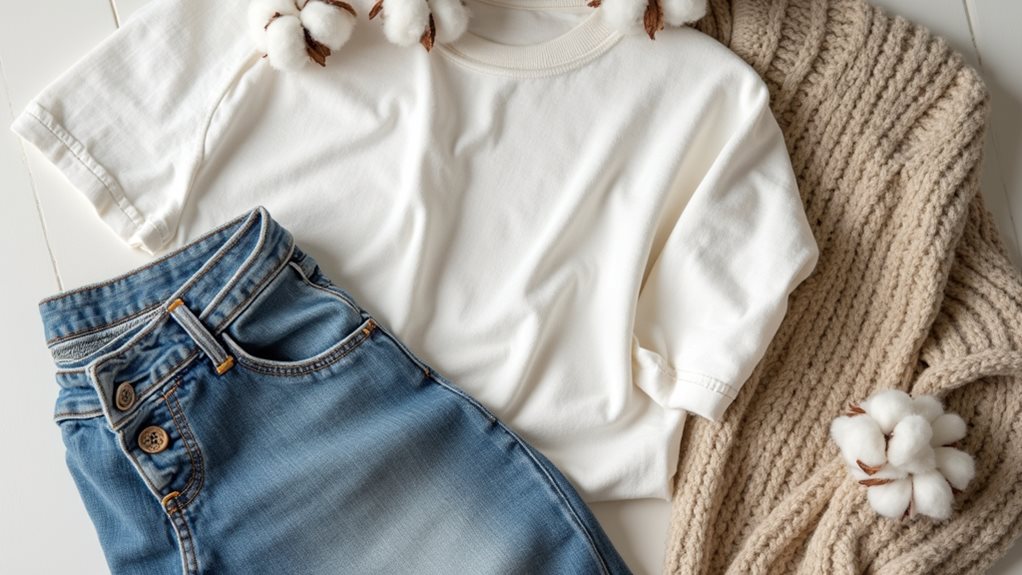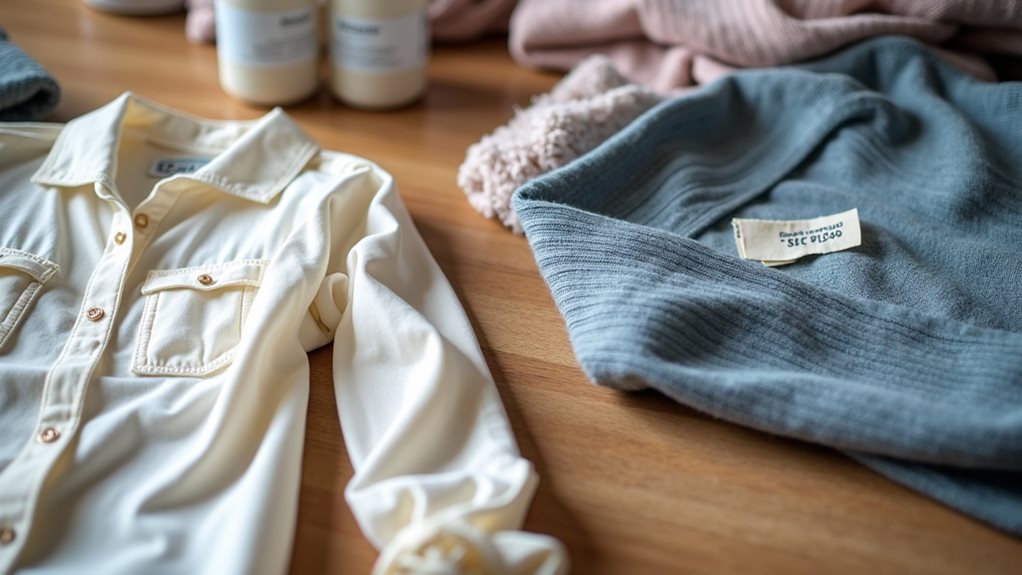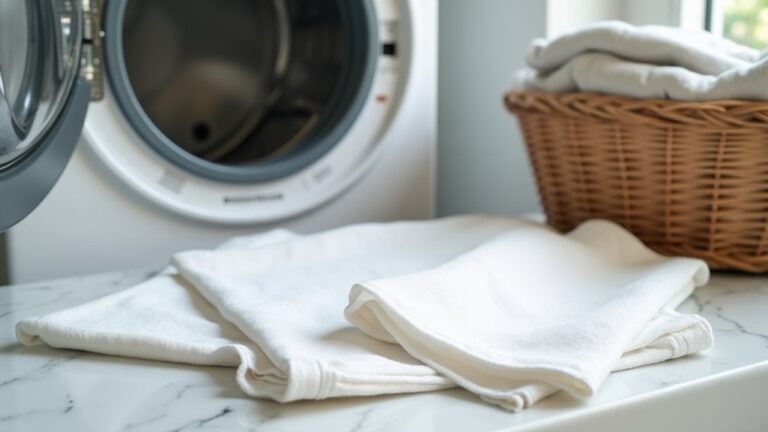Skip dry cleaning for cotton t-shirts, polyester blouses, nylon activewear, and spandex leggings – these fabrics actually thrive in your washing machine and will thank you for it. I learned this the hard way after years of unnecessarily spending money on professional cleaning for my favorite cotton dress shirts, only to discover they looked better after a gentle home wash. Even some embellished garments with sequins or beads can suffer damage from harsh dry cleaning chemicals and heat. There’s so much more to discover about saving money while protecting your wardrobe.
Understanding Fabric Types That Avoid Dry Cleaning
While I used to think that anything nice automatically needed dry cleaning, I’ve learned through years of laundry mishaps and triumphs that many fabrics actually prefer the gentle hold of your washing machine at home.
Cotton, polyester, nylon, spandex, acrylic, and acetate are surprisingly resilient warriors that laugh in the face of water and detergent 😊. Your trusty cotton shirts can handle warm water cycles without breaking a sweat, while durable polyester blends practically beg for delicate machine washing.
The secret lies in reading each care label like a treasure map—it’ll tell you whether something can be hand washed or tossed confidently into your machine, saving you countless dollars and dry cleaning trips. Understanding your garment’s fabric composition helps you avoid the heartbreak of shrinkage, color bleeding, or texture changes that can occur when the wrong cleaning method meets the wrong material.
Cotton and Natural Fibers Best Suited for Home Washing

You’ll find that cotton becomes your laundry room’s best friend, since it thrives in regular machine washing with warm or cool water, saving you countless trips to the dry cleaner and keeping your wallet happier in the process.
Natural fibers like linen also prefer the gentle treatment of home washing, though I’ve learned the hard way that cold water prevents those heartbreaking moments when your favorite shirt shrinks two sizes or fades to an unfortunate shade of blah.
The beauty of these fabrics lies in their resilience and forgiveness, allowing you to maintain them easily at home while preserving their comfort and durability through simple, thoughtful care routines.
Always check the care labels on your cotton garments first, as some items with special finishes or structured elements may still require professional cleaning despite cotton’s generally low-maintenance nature.
Cotton Machine Washing Benefits
When I first started doing my own laundry in college, I quickly discovered that cotton became my best friend in the washing machine, proving itself as one of the most forgiving and reliable fabrics you can toss into your weekly wash cycle.
Unlike those finicky fabrics that dry cleaners use special solvents for, cotton thrives with simple machine washing and regular detergent. You’ll save serious money on cleaning care since cotton handles warm water, aggressive agitation, and even the occasional bleach mishap without throwing a tantrum.
I’ve learned that cotton’s durability means you can air-dry or tumble-dry without worrying about shrinkage disasters, and stains actually come out easier than with delicate materials that require professional intervention. Cotton shirts and jeans represent the perfect everyday items that benefit most from traditional water-based washing rather than expensive dry cleaning services.
Natural Fiber Care Tips
Since discovering the magic of natural fibers during my laundry-learning expedition, I’ve become something of a cotton evangelist, preaching the gospel of home washing to anyone who’ll listen because these fabrics genuinely want to be cared for in your own machine.
Natural fibers like cotton, nylon, and polyester thrive with regular detergent and water, making them perfect candidates for skipping the dry cleaner altogether.
However, you’ll want to check those care labels religiously – I learned this lesson the hard way after shrinking my favorite cotton sweater 😅.
After washing, lay delicate pieces flat or hang them to dry, which helps maintain their shape and prevents that dreaded stretched-out look that makes clothes appear sad and defeated.
Regular home washing of these natural fibers actually helps prevent fabric degradation that can occur when garments are left unwashed for too long.
Synthetic Materials That Thrive With Regular Laundering

You’ll find that synthetic fabrics like polyester, nylon, and spandex actually prefer your home washing machine over the harsh chemicals used in dry cleaning, and honestly, they’re some of the most forgiving materials you’ll ever work with.
These modern marvels can handle regular laundering cycles without losing their shape or color, which means you’re saving money while keeping your activewear, work blouses, and everyday pieces looking fresh.
I’ve learned through years of laundry mishaps 😅 that synthetic materials are incredibly resilient, bouncing back from machine washing and drying cycles that would leave natural fibers looking worse for wear.
Plus, avoiding dry cleaning means you’re steering clear of traditional solvents like perchloroethylene (PERC) that can cause respiratory irritation and other health concerns with regular exposure.
Machine-Washable Synthetic Fabrics
Although my grandmother insisted that anything “nice” belonged at the dry cleaner, I’ve learned through years of laundry mishaps and successes that synthetic fabrics like polyester, nylon, and spandex actually prefer the straightforward approach of your home washing machine.
These materials are surprisingly resilient warriors that can handle regular detergents, warm water, and even the occasional forgotten sock stuck to them for an entire wash cycle 😅.
Unlike their delicate natural fiber cousins, synthetic fabrics resist wrinkles, shrinking, and fading, making machine washing not merely acceptable but ideal.
Your acrylic sweaters and acetate blouses will thank you for skipping the harsh dry cleaning chemicals, and your wallet will definitely appreciate avoiding those expensive bills while maintaining fresh, clean clothes.
Additionally, avoiding dry cleaning for these synthetic materials means you won’t have to worry about PERC residues potentially remaining on your garments after the cleaning process.
Home Laundering Benefits
The real magic happens when you discover that washing synthetic fabrics at home isn’t just about saving money—it’s about giving these materials exactly what they need to look their best for years to come.
Home laundering becomes your secret weapon against stubborn odors and allergens that love to hide in polyester and nylon fibers, something dry cleaning simply can’t tackle as effectively.
When you master appropriate water temperatures for different synthetic blends, you’ll notice your favorite workout gear and everyday pieces maintaining their vibrant colors and stretch longer than ever before.
Plus, there’s something deeply satisfying about tossing your synthetic fabrics into the washer whenever they need freshening up, rather than waiting for your monthly dry cleaning run. 💪
Home laundering your synthetic work clothes also means you’ll avoid the hassle of keeping detailed receipts for dry cleaning expenses that typically aren’t tax deductible anyway.
When Care Labels Mislead About Dry Cleaning Necessity

Why do clothing manufacturers slap “dry clean only” labels on items that could easily survive a gentle spin in your washing machine?
Sometimes it’s just legal protection – they’d rather you spend extra on dry cleaning helps than risk complaints about fabric damage.
Manufacturers choose overly cautious care labels to avoid liability issues rather than trust consumers with proper washing techniques.
I’ve discovered that many cotton and polyester pieces labeled this way wash beautifully at home, saving me hundreds annually.
Those care instructions often err on the side of extreme caution, especially for supposedly delicate fabrics like certain cashmere sweaters that actually prefer gentle hand-washing with mild detergent.
My nylon workout gear and acrylic scarves? They laugh at dry cleaning chemicals while thriving in regular wash cycles.
When you’re unsure, test an inconspicuous area first – your wallet will thank you! 💡
However, be aware that water exposure can cause serious issues like fabric shrinkage, color bleeding, and texture changes in truly delicate garments, which is why some items genuinely require professional dry cleaning with specialized solvents.
Embellished Garments That Risk Damage During Dry Cleaning

When sequins and beads catch your eye in that gorgeous evening dress, remember they’re also catching trouble if you send them off to dry cleaning without a second thought.
Those embellished garments you adore can turn into expensive disasters when exposed to harsh chemicals and aggressive agitation that dry cleaners use.
I learned this lesson the hard way when my favorite beaded top came back looking like it had survived a glitter explosion gone wrong. The harsh solvents weakened the threads holding everything together, while the heat melted some of my plastic sequins into sad, warped shadows of their former selves.
- Sequins and beads can loosen or fall off completely
- Heat can melt plastic embellishments into unrecognizable shapes
- Colors may bleed onto surrounding fabric
- Delicate threads holding decorations can weaken or break
Instead, choose gentle hand washing or find professional cleaning specialists experienced with delicate embellishments.
While dry cleaning is excellent for preserving delicate fabrics like silk and wool, the chemical solvents that make it so effective for removing oils and grease can be too aggressive for garments with intricate embellishments.
Cost-Effective Alternatives to Professional Cleaning Services

Before you hand over another twenty dollars at the dry cleaner’s counter, consider that most of your wardrobe doesn’t actually need their expensive services, and you’re probably capable of achieving the same results right at home with a little know-how and confidence.
Cotton, nylon, polyester, spandex, and acrylic fabrics laugh in the face of dry cleaning costs—they’re practically begging for a simple home wash with appropriate water temperatures and quality detergents.
Even your precious cashmere sweater responds beautifully to careful hand washing with gentle detergent, saving you serious cash while maintaining that luxurious feel.
Your delicate cashmere doesn’t need expensive professional treatment—gentle hand washing at home preserves luxury while protecting your wallet.
Home dry cleaning kits work wonders for freshening garments between wears, and investing in mesh laundry bags protects delicate items during machine cycles, proving that professional services aren’t always necessary.
For stubborn marks, spot cleaning techniques using specialized solvents can effectively target specific stains without requiring a full professional cleaning treatment.




